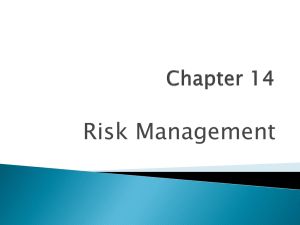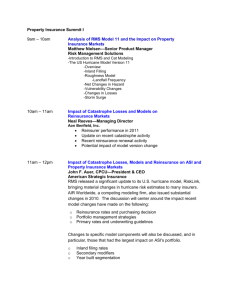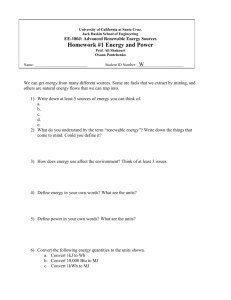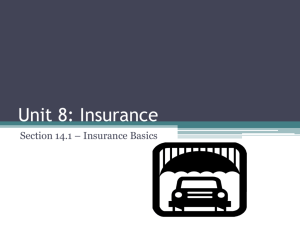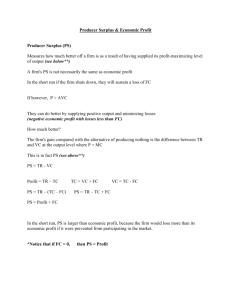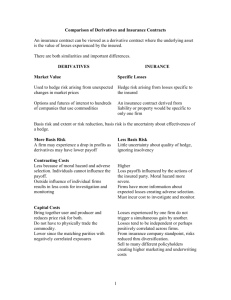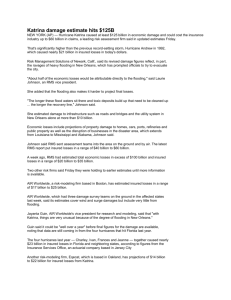P6466 - iii Template - Insurance Information Institute
advertisement
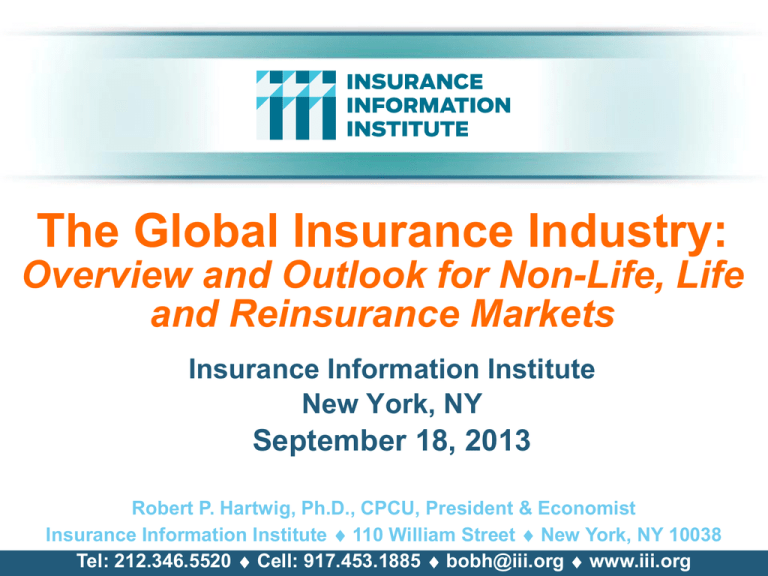
The Global Insurance Industry: Overview and Outlook for Non-Life, Life and Reinsurance Markets Insurance Information Institute New York, NY September 18, 2013 Robert P. Hartwig, Ph.D., CPCU, President & Economist Insurance Information Institute 110 William Street New York, NY 10038 Tel: 212.346.5520 Cell: 917.453.1885 bobh@iii.org www.iii.org Presentation Outline Is the World Becoming a Riskier Place? Global Economic Overview: Insurance Implications Global Insurance Overview Life, Non-Life Analysis Regional Differences A Look Ahead Global Catastrophe Loss Trends The New Investment Reality The Challenge of Persistently Low Interest Rates Global Reinsurance Market Trends The Increasing Role of Alternative Capital Cyber Risk: A Growing Global Concern 2 What in the World Is Going On? U.S. and Global Perspective Is the World Becoming a Riskier, More Uncertain Place? All Major Categories of Risk Influence Economies and Insurance Industry on a Global Scale 3 Uncertainty, Risk and Fear Abound: Insurance Can Help Mitigate Risk Never Ending Echoes of the Financial Crisis European Sovereign Debt & Eurozone Crises US Debt and Budget Crisis “Hard Landing” in China Unemployment Monetary Policy/Taper/Interest Rates Political Gridlock Political Upheaval in the Middle East/Syria Resurgent Terrorism Risk Diffusion of Weapons of Mass Destruction Cyber Attacks Record Natural Disaster Losses Climate Change Environmental Degradation Income Inequality Are “Black Swans” everywhere or does it just seem that way? 4 5 Major Categories for Global Risks, Uncertainties and Fears: Insurance Solutions 1. Economic Risks 2. Geopolitical Risks 3. Environmental Risks 4. Technological Risks 5. Societal Risks While risks can be broadly categorized, none are mutually exclusive Source: World Economic Forum, Global Risks 2012; Insurance Information Institute. 5 Top 5 Global Risks in Terms of Likelihood, 2007—2012: Insurance Can Help With Most In 2012, concerns over income disparity and fiscal imbalances displaced weather and water concerns, as ranked by likelihood Concerns Shift Considerably Over Short Spans of Time. Shift in 2012 to Economic Risks and Away from Environmental Risks Source: World Economic Forum, Global Risks 2012; Insurance Information Institute. 6 The Strength of the Economy Will Influence P/C Insurer Growth Opportunities Growth Will Expand Insurer Exposure Base Across Most Lines 8 GDP Growth: Advanced & Emerging Economies vs. World, 1970-2014F GDP Growth (%) 10.0 8.0 World output is forecast to grow by 3.1% in 2013 and 3.8% in 2014. The world economy shrank by 0.6% in 2009 amid the global financial crisis Emerging economies (led by China) are expected to grow by 5.0% in 2013 and 5.4% in 2014. 6.0 4.0 2.0 (2.0) (4.0) Advanced economies are expected to grow at a sluggish pace of 1.2% in 2013 but accelerate to 2.1% in 2014. 70 71 72 73 74 75 76 77 78 79 80 81 82 83 84 85 86 87 88 89 90 91 92 93 94 95 96 97 98 99 00 01 02 03 04 05 06 07 08 09 10 11 12 13F 13F 0.0 Advanced economies Emerging and developing economies Source: International Monetary Fund, World Economic Outlook , July 2013 WEO Update; Ins. Info. Institute. World 1.4% -8.9% 2013 is expected to see uneven growth, then gradually accelerate throughout the year and into 2014 2000 2001 2002 2003 2004 2005 2006 07:1Q 07:2Q 07:3Q 07:4Q 08:1Q 08:2Q 08:3Q 08:4Q 09:1Q 09:2Q 09:3Q 09:4Q 10:1Q 10:2Q 10:3Q 10:4Q 11:1Q 11:2Q 11:3Q 11:4Q 12:1Q 12:2Q 12:3Q 12:4Q 13:1Q 13:2Q 13:3Q 13:4Q 14:1Q 14:2Q 14:3Q 14:4Q -9% -5.3% -7% -3.7% -5% Recession began in Dec. 2007. Economic toll of credit crunch, housing slump, labor market contraction was severe -1.8% -1% -3% 2.3% 2.2% 2.6% 2.4% 0.1% 2.5% 1.3% 4.1% 2.0% 1.3% 3.1% 0.4% 1.1% 2.5% 2.1% 2.6% 2.7% 2.8% 2.9% 3.0% 1% -0.3% 3% 1.3% 5% The Q4:2008 decline was the steepest since the Q1:1982 drop of 6.8% 1.1% 1.8% 2.5% 3.6% 3.1% 2.7% 0.5% 3.6% 3.0% 1.7% 7% 4.1% Real GDP Growth (%) 5.0% US Real GDP Growth* Demand for Insurance Continues To Be Impacted by Sluggish Economic Conditions, but the Benefits of Even Slow Growth Will Compound and Gradually Benefit the Economy Broadly * Estimates/Forecasts from Blue Chip Economic Indicators. Source: US Department of Commerce, Blue Economic Indicators 9/13; Insurance Information Institute. 10 7.6% 7.8% 2.4% 2.6% 9.3% 1.8% 1.6% 0.9% 0.2% 0.9% 0.9% 1.5% 2.6% 2.2% 1.6% 2% 1.8% 4% 4.6% 1.8% 6% 3.4% The Eurozone is ending 3.0% 8% Growth in China has outpaced the US and Europe 3.0% 10% US growth should accelerate in 2014 7.7% Real GDP Growth Forecasts: Major Economies: 2011 – 2014F -2% US -0.6% -0.6% 0% Euro Area 2011 UK 2012 Latin America 2013F Canada China 2014F Growth Prospects Vary Widely by Region: Growth Returning in the US, Recession in the Eurozone, Some strengthening in Latin America Sources: Blue Chip Economic Indicators (9/2013 issue); Insurance Information Institute. 11 S. Korea 4.1% 2.9% 3.9% 3.9% 2.8% 2.6% 3.6% 2.4% 3.5% 2.7% 0.9% 2.7% 3.6% 2.8% 3.4% 4.3% 6.7% 5.7% 4.0% 3.7% Strong economies in smaller industrialized nations will bolster demand for products, services, international trade and insure 1.3% 2.8% 4.1% 3.6% 2.7% 2.0% 3.6% 9% 8% 7% 6% 5% 4% 3% 2% 1% 0% 7.7% Real GDP Growth Forecasts: Selected Economies: 2011 – 2014F Taiwan India 2011 2012 Russia 2013F Brazil Australia Mexico 2014F Growth Outside the US, Europe and Japan is Relatively Strong Sources: Blue Chip Economic Indicators (9/2013 issue); Insurance Information Institute. 12 Global Insurance Premium Growth Trends: Life and Non-Life Growth Is Uneven Across Regions and Market Segments 13 World N. America Latin America Life Non-Life Total 13.0% 10.5% 13.8% -1.0% -0.1% 3.9% 4.8% 4.2% 1.9% 13.0% 8.1% 8.8% 5.8% 4.9% W. Central & Advanced Emerging Europe E. Europe Asia Asia Middle East & Central Asia Africa -4.9% -10% Growth in Advanced Asia (incl. China) markets was third highest in 2012 -0.4% -5% -2.0% -3.1% 0% 4.8% 5.1% Latin America growth was the strongest in 2012 -0.4% 1.8% 1.7% 2.0% 2.4% 5% 2.6% 10% 2.3% 15% 11.7% 20% 7.8% 16.8% Premium Growth by Region, 2012 Oceania Global Premium Volume Totaled $4.613 Trillion in 2012, up 2.4% from $4.566 Trillion in 2011. Global Growth Was Weighed Down by Slow Growth in N. America and W. Europe and Partially Offset by Emerging Markets Source: Swiss Re, sigma, No. 3/2013. 14 Distribution of Global Insurance Premiums, 2012 ($ Trillions) Total Premium Volume = $4.613 Trillion* Non-Life, $1.99 , 43.2% Life insurance accounted for nearly 57% of global premium volume in 2012 vs. 43% for Non-Life Life, $2.62 , 56.8% Source: Swiss Re, sigma, No. 3/2013; Insurance Information Institute. 15 Global Real (Inflation Adjusted) Premium Growth (Life and Non-Life): 2012 Emerging markets in Asia, including China, showed faster growth an the US or Europe Market Life Non-Life Total Advanced 1.8 1.5 1.7 Emerging 4.9 8.6 6.8 World 2.3 2.6 2.4 Source: Swiss Re, sigma, No. 3/2013. 16 Life Insurance: Global Real (Inflation Adjusted) Premium Growth, 2012 Real growth in life insurance premiums was a bit slower in China than the US Market Life Non-Life Total Advanced 1.8 1.5 1.7 Emerging 4.9 8.6 6.8 World 2.3 2.6 2.4 Source: Swiss Re, sigma, No. 3/2013. 17 Life Insurance: Global Real (Inflation Adjusted) Premium Growth, 2012 Global Life Insurance growth in 2012 was lower than the precrisis average but above than the postcrisis average. Advanced Asia economies like China saw stronger growth on average than before or after the crisis. Source: Swiss Re, sigma, No. 3/2013. 18 Non-Life Insurance: Global Real (Inflation Adjusted) Premium Growth, 2012 Real growth in nonlife insurance premiums was faster in China than the US Market Life Non-Life Total Advanced 1.8 1.5 1.7 Emerging 4.9 8.6 6.8 World 2.3 2.6 2.4 Source: Swiss Re, sigma, No. 3/2013. 19 Global Real (Inflation Adjusted) Nonlife Premium Growth: 1980-2010 Average: 1980-2010 Real growth rates Industrialized Countries: 3.8% Emerging Markets: 9.2% 20% Overall Total: 4.2% Nonlife premium growth in emerging markets has exceeded that of industrialized countries in 27 of the past 31 years, including the entirety of the global financial crisis.. 15% 10% 5% 0% -10% Real nonlife premium growth is very erratic in part to inflation volatility in emerging markets as well as a lack of consistent cyclicality 1980 1981 1982 1983 1984 1985 1986 1987 1988 1989 1990 1991 1992 1993 1994 1995 1996 1997 1998 1999 2000 2001 2002 2003 2004 2005 2006 2007 2008 2009 2010 -5% Total Source: Swiss Re, sigma, No. 2/2010. Industrialised countries Emerging markets 20 Net Premium Growth: Annual Change, 1971—2013:Q1 (Percent) 1975-78 1984-87 25% 2000-03 Net Written Premiums Fell 0.7% in 2007 (First Decline Since 1943) by 2.0% in 2008, and 4.2% in 2009, the First 3Year Decline Since 1930-33. 20% 15% 2013:Q1 = 4.1% 10% 2012 growth was +4.3% 5% 0% 71 72 73 74 75 76 77 78 79 80 81 82 83 84 85 86 87 88 89 90 91 92 93 94 95 96 97 98 99 00 01 02 03 04 05 06 07 08 09 10 11 12 13:Q1 -5% Shaded areas denote “hard market” periods Sources: A.M. Best (historical and forecast), ISO, Insurance Information Institute. 21 Non-Life Insurance: Global Real (Inflation Adjusted) Premium Growth, 2012 Global Non-Life growth in 2012 exceeded the precrisis and post-crisis average. The same is true for advanced Asia economies like China Source: Swiss Re, sigma, No. 3/2013. 22 Life and Non-Life Insurance Penetration as a % of GDP: 1962-2012 Source: Swiss Re, sigma, No. 3/2013. Non-life markets have been slower to grow than life Emerging Markets Advanced Markets Life insurance in emerging markets has experienced the fastest in recent decades 23 Premiums Written in Life and Non-Life, by Region: 1962-2012 Emerging market shares rose rapidly over the past 50 years Source: Swiss Re, sigma, No. 3/2013. 24 Population Distribution, by Region: 1962-2062F Enormous population shifts will impact insurance demand over the next half century Africa is expected to be the fastest population growth over the next 50 years, but no expectation now of Asialike growth in economies or insurance demand Source: Swiss Re, sigma, No. 3/2013 from United Nations Department of Economic and Sovial Affairs, Population Division. 25 Relationship Between Real GDP and Real Life and Non-Life Premium Growth, 2012 Advanced Markets The was a clear but highly relationship between real GDP growth and real premium growth in advance markets in 2012 Source: Swiss Re, sigma, No. 3/2013. Emerging Markets The correlation between real GDP growth and real premium growth in emerging markets was much stronger than in advanced markets in 2012 26 Insurance Density and Penetration for Advanced and Emerging Markets, 2012 Advanced Markets Emerging Markets Spending and penetration are highly variable in emerging markets Spending and penetration are generally much higher in advanced markets, though growth is fastest in emerging markets Source: Swiss Re, sigma, No. 3/2013. Chinese spending on insurance is very similar to Russia, but Russian spending is mostly non-life and in China the majority is life 27 Political Risk in 2011/12: Greatest Business Opportunities Are Often in Risky Nations The fastest growing markets are generally also among the politically riskiest, including East and South Asia Heightened risk has economic and insurance implications Australia and NZ rate well but most neighbors do not Source: Maplecroft 28 U.S. P/C (Non-Life) Insurance Industry Financial Overview So Far, So Good: Profit Recovery in 2013 After High CAT Losses in 2011-12 29 P/C Net Income After Taxes 1991–2013:H1 ($ Millions) $27,000 $33,522 $19,456 $3,043 $28,672 $35,204 $62,496 $65,777 Net income is up substantially (+64%) from 2012:H1 $16.4B $44,155 $38,501 $30,029 $20,559 $20,598 $10,870 $3,046 $10,000 $19,316 $20,000 $5,840 $30,000 $14,178 $40,000 $21,865 $50,000 $30,773 $60,000 $36,819 $70,000 2005 ROE*= 9.6% 2006 ROE = 12.7% 2007 ROE = 10.9% 2008 ROE = 0.1% 2009 ROE = 5.0% 2010 ROE = 6.6% 2011 ROAS1 = 3.5% 2012 ROAS1 = 5.9% 2013:H1 ROAS1 = 9.1%E $24,404 $80,000 $0 -$10,000 -$6,970 91 92 93 94 95 96 97 98 99 00 01 02 03 04 05 06 07 08 09 10 11 •ROE figures are GAAP; 1Return on avg. surplus. Excluding Mortgage & Financial Guaranty insurers yields a 9.7% ROAS in 2013:Q1, 6.2% ROAS in 2012, 4.7% ROAS for 2011, 7.6% for 2010 and 7.4% for 2009. Sources: A.M. Best, ISO, Insurance Information Institute 1213:Q1E Profitability Peaks & Troughs in the P/C Insurance Industry, 1975 – 2013:H1* ROE History suggests next ROE peak will be in 2016-2017 25% 1977:19.0% 1987:17.3% 20% 2006:12.7% 1997:11.6% 2013:H1 9.1%(est) 15% 9 Years 10% 5% 2012: 5.9% 0% 1975: 2.4% 1992: 4.5% 2001: -1.2% 75 76 77 78 79 80 81 82 83 84 85 86 87 88 89 90 91 92 93 94 95 96 97 98 99 00 01 02 03 04 05 06 07 08 09 10 11 12 13:H1 -5% 1984: 1.8% *Profitability = P/C insurer ROEs. 2011-13 figures are estimates based on ROAS data. Note: Data for 2008-2013 exclude mortgage and financial guaranty insurers. Source: Insurance Information Institute; NAIC, ISO, A.M. Best. US Non-Life Policyholder Surplus (Capital), 2006:Q4–2013:Q1 ($ Billions) Drop due to near-record 2011 CAT losses 2007:Q3 Pre-Crisis Peak $620 $607.7 $600 $583.5$586.9 $566.5 $580 $559.2 $560 $540 $520 $500 $480 $460 $440 $544.8 $540.7 $530.5 $521.8$517.9 $515.6 $512.8 $505.0 $496.6 $487.1 $478.5 The Industry now has $1 of surplus for every $0.80 of NPW, close to the strongest claims-paying status in its history. $570.7 $567.8 $559.1 $550.3 $538.6 $511.5 $490.8 $455.6 $463.0 Surplus as of 3/31/13 stood at a record high $607.7B $437.1 $420 06:Q407:Q107:Q207:Q307:Q408:Q108:Q208:Q308:Q409:Q109:Q209:Q309:Q410:Q110:Q210:Q310:Q411:Q111:Q211:Q311:Q412:Q112:Q212:Q312:Q413:Q1 *Includes $22.5B of paid-in capital from a holding company parent for one insurer’s investment in a noninsurance business in early 2010. Sources: ISO, A.M .Best. The P/C Insurance Industry Both Entered and Emerged from the 2012 Hurricane Season Very Strong Financially. 32 Yield in the US are among the lowest in the world. Persistently low yields are exerting pricing pressure on all insurers. 14.0% 12.0% 2.0% 5.24% 4.49% 1.88% 0.72% 4.0% 2.62% 2.78% 6.0% 2.99% 8.0% 7.32% 10.0% 7.75% 11.61% Current Yields on 10-Year Government Bonds* *Latest available. Source: The Economist, Aug. 31, 2013; Insurance Information Institute. ic o M ex C ol o m bi a hi le C il ra z B n Sp ai ne Eu ro zo pa n Ja K U da an a C U S 0.0% 33 INVESTMENTS: THE NEW REALITY Investment Performance is a Key Driver of Profitability Depressed Yields Will Necessarily Influence Underwriting & Pricing 34 Property/Casualty Insurance Industry Investment Income: 2000–2013*1 ($ Billions) $60 $54.6 $52.3 $51.2 $49.5 $50 $49.2 $47.1 $47.7 $47.6 $45.5 $40 $38.9 $38.7 $37.1 $36.7 01 02 $39.6 Investment earnings are running below their 2007 pre-crisis peak $30 00 03 04 05 06 07 08 09 10 11 12 13* Investment Income Fell in 2012 and is Falling in 2013 Due to Persistently Low Interest Rates, Putting Additional Pressure on (Re) Insurance Pricing 1 Investment gains consist primarily of interest and stock dividends.. *Estimate based on annualized actual Q1:2013 investment income of $11.385B. Sources: ISO; Insurance Information Institute. $1.38 $6.21 -$7.90 -$19.81 -$15 -$20 -$25 $7.04 $5.85 $8.92 $3.52 $9.70 -$1.21 $6.61 $6.63 $9.13 Realized capital gains in 2012 were down 12% from 2011 $16.21 $13.02 $10.81 $9.24 $6.00 $9.82 $9.89 $1.66 $5 $0 -$5 -$10 $4.81 $20 $15 $10 $2.88 ($ Billions) $18.02 P/C Insurer Net Realized Capital Gains/Losses, 1990-2013:Q1 90 91 92 93 94 95 96 97 98 99 00 01 02 03 04 05 06 07 08 09 10 11 1213:Q1 Insurers Posted Net Realized Capital Gains in 2010, 2011 and 2012 Following Two Years of Realized Losses During the Financial Crisis. Realized Capital Losses Were the Primary Cause of 2008/2009’s Large Drop in Profits and ROE Sources: A.M. Best, ISO, Insurance Information Institute. 36 Property/Casualty Insurance Industry Investment Gain: 1994–2013:Q11 ($ Billions) $70 $64.0 $59.4 $55.7 $58.0 $56.9 $52.3 $51.9 $60 $47.2 $42.8 $50 $48.9 $45.3 $44.4 $40 $35.4 $56.2 $53.9 $53.4 $39.2 $36.0 $31.7 $30 $20 Investment gains in 2012 were approximately 16% below their pre-crisis peak $10 $12.8 $0 94 95 96 97 98 99 00 01 02 03 04 05* 06 07 08 09 10 11 12 13:Q1 Investment Gains Are Slipping in 2012 as Low Interest Rates Reduce Investment Income and Lower Realized Investment Gains; The Financial Crisis Caused Investment Gains to Fall by 50% in 2008 1 Investment gains consist primarily of interest, stock dividends and realized capital gains and losses. * 2005 figure includes special one-time dividend of $3.2B; Sources: ISO; Insurance Information Institute. U.S. Treasury Security Yields: A Long Downward Trend, 1990–2013* 9% Yields on 10-Year U.S. Treasury Notes have been essentially below 5% for a full decade. 8% 7% U.S. Treasury security yields recently plunged to record lows 6% 5% 4% 3% 2% 1% 0% Recession 2-Yr Yield 10-Yr Yield '90 '91 '92 '93 '94 '95 '96 '97 '98 '99 '00 '01 '02 '03 '04 '05 '06 '07 '08 '09 '10 '11 '12 '13 Since roughly 80% of P/C bond/cash investments are in 10-year or shorter durations, most P/C insurer portfolios will have low-yielding bonds for years to come. *Monthly, constant maturity, nominal rates, through July 2013. Sources: Federal Reserve Bank at http://www.federalreserve.gov/releases/h15/data.htm. National Bureau of Economic Research (recession dates); Insurance Information Institute. 38 U.S. Insured Catastrophe Loss Update Catastrophe Losses in Recent Years Have Been Very High 39 Natural Disasters Worldwide, 1980 – 2013* (Number of Events) There were 460 natural disaster events globally in the first half of 2013 and 905 for full-year 2012 1 200 1 000 Number 800 600 400 41 19 200 121 3 1980 1982 1984 1986 1988 Geophysical (earthquake, tsunami, volcanic activity) *Through June 30, 2013. Source: MR NatCatSERVICE 1990 1992 1994 1996 1998 2000 Meteorological (storm) Hydrological (flood, mass movement) 2002 2004 2006 2008 2010 2012 Climatological (temperature extremes, drought, wildfire) 40 Top 16 Most Costly World Insurance Losses, 1970-2012* (Insured Losses, 2012 Dollars, $ Billions) 2012 insured CAT Losses totaled $60B; Economic losses totaled $140B, according to Swiss Re $60 $50 $40 $30 $20 $10 5 of the top 14 most expensive catastrophes in world history have occurred within the past 3 years (2010-2012) $48.7 Hurricane Sandy is now the 6th costliest event in global insurance history $11.1 $13.4 $13.4 $9.6 $9.2 $8.7 $8.5 $8.1 $7.8 $38.6 $23.9 $24.6 $25.6 $18.8 $13.4 $0 Hugo (1989) Winter Storm Daria (1991) Chile Quake (2010) Ivan Charley Typhoon Wilma Thailand New Ike Sandy Northridge WTC (2004) (2004) Mirielle (2005) Floods Zealand (2008) (2012)** (1994) Terror (1991) (2011) Quake Attack (2011) (2001) *Figures do not include federally insured flood losses. **Estimate based on PCS value of $18.75B as of 4/12/13. Sources: Munich Re; Swiss Re; Insurance Information Institute research. Andrew Japan Katrina (1992) Quake, (2005) Tsunami (2011)** 41 Losses Due to Natural Disasters Worldwide, 1980–2013* (Overall & Insured Losses) (Overall and Insured Losses) (2012 Dollars, $ Billions) 2012 Losses 450 Overall : $101.1B 400 Insured: $57.9B 350 2013: 1st Half Losses There is a clear upward trend in both insured and overall losses over the past 30+ years 300 250 200 Overall : $45B Insured: $13B 150 100 50 1980 1982 1984 1986 1988 1990 Overall losses (in 2012 values) *Through June 30, 2013. Source: MR NatCatSERVICE 1992 1994 1996 1998 2000 2002 2004 2006 2008 2010 2012 Insured losses (in 2012 values) 42 Natural Loss Events: Full Year 2012 World Map Winter Storm Andrea Europe, 5–6 January Severe Weather USA, 28–29 April Hailstorms, severe weather Canada, 12–14 August Severe Storms, tornadoes USA, 2–4 March Hurricane Isaac USA, Caribbean 24–31 August Earthquake Mexico, 20 March Typhoon Haikui China, 8–9 August Earthquake Iran, 11 August Floods Pakistan, 3 –27 September Typhoon Bopha Philippines, 4–5 December Floods, flash floods Australia, Jan – Feb Floods, hailstorms South Africa, 20 –21 October Number of events: 905 Selection of significant Natural catastrophes Earthquake Italy, 29 May/3 June Floods Nigeria, Jul – Oct Floods Columbia, Mar – Jun Natural catastrophes Cold Wave Afghanistan, Jan – Mar Floods Flash Floods China, 21–24 July Russia, 6–8 July Severe storms USA, 28 June –2 July Hurricane Sandy USA, Caribbean 24–31 October Drought USA, Summer Cold Wave Eastern Europe, Jan – Feb Floods United Kingdom, 21–27 November Geophysical events (earthquake, tsunami, volcanic activity) Meteorological events (storm) Source: Geo Risks Research, NatCatSERVICE – As of January 2013 Floods. flash floods Australia, Feb – Mar Hydrological events (flood, mass movement) Climatological events (extreme temperature, drought, wildfire) 43 Natural Catastrophes January – June 2013 World map with significant events Floods Canada, June Floods Europe, June Winter storm USA, 7–11 April Earthquake China, 20 April Severe storms, tornadoes USA, 18–20 March Floods India, June Severe storms, tornadoes USA, 18–19 March Heat wave India, June Number of events: 460 Natural catastrophes Selection of significant loss events Geophysical events (earthquake, tsunami, volcanic activity) Meteorological events (storm) Source: 2013 Münchener Rückversicherungs-Gesellschaft, Geo Risks Research, NatCatSERVICE – as at June 2013 Floods Indonesia, 15–22 January Floods Australia, 21–31 January Hydrological events (flood, mass movement) Climatological events (extreme temperature, drought, wildfire) 44 U.S. Insured Catastrophe Losses $73.4 ($ Billions, $ 2012) $33.6 $35.0 $7.9 $7.5 $10.5 $29.2 $33.7 $16.3 $7.6 $6.1 $11.6 $14.3 $3.8 $11.0 $12.6 $8.8 $10 $8.0 $20 $4.8 $30 $14.0 $40 $26.4 $37.8 $50 $34.7 $60 $14.4 $70 2012 was likely the third most expensive year ever for insured CAT losses $11.5 $80 $0 89 90 91 92 93 94 95 96 97 98 99 00 01 02 03 04 05 06 07 08 09 10 11 12 13* 2012 Was the 3rd Highest Year on Record for Insured Losses in U.S. History on an Inflation-Adj. Basis. 2011 Losses Were the 6th Highest. YTD 2013 Running Below Average But Q3 Is Typically the Costliest Quarter. Record tornado losses caused 2011 CAT losses to surge *Through 6/2/13. Includes $2.6B for 2013:Q1 (PCS) and $5.32B for the period 4/1 – 6/2/13 (Aon Benfield Monthly Global Catastrophe Recap). Note: 2001 figure includes $20.3B for 9/11 losses reported through 12/31/01 ($25.9B 2011 dollars). Includes only business and personal property claims, business interruption and auto claims. Non-prop/BI losses = $12.2B ($15.6B in 2011 dollars.) Sources: Property Claims Service/ISO; Insurance Information Institute. 45 45 Top 16 Most Costly Disasters in U.S. History (Insured Losses, 2012 Dollars, $ Billions) Hurricane Sandy could become the 4th or 5th costliest event in US insurance history $60 $50 $48.7 $40 $30 Includes Tuscaloosa, AL, tornado Includes Joplin, MO, tornado $23.9 $24.6 $25.6 $18.8 $20 $10 $0 $9.2 $11.1 $8.7 $7.8 $7.5 $7.1 $6.7 $4.4 $5.6 $5.6 Irene (2011) Jeanne (2004) Frances (2004) Rita Tornadoes/Tornadoes/ Hugo (2005) T-Storms T-Storms (1989) (2011) (2011) Hurricane Irene became the 12th most expense hurricane in US history in 2011 Ivan (2004) Charley (2004) Wilma (2005) $13.4 Ike (2008) Sandy* Northridge9/11 Attack Andrew (2012) (1994) (2001) (1992) Katrina (2005) 12 of the 16 Most Expensive Events in US History Have Occurred Over the Past Decade *PCS estimate as of 4/12/13. Sources: PCS; Insurance Information Institute inflation adjustments to 2012 dollars using the CPI. 46 Natural Disasters in the United States, 1980 – June 2013* Number of Events (Annual Totals 1980 – June 2013*) 300 There were 68 natural disaster events in the first half of 2013 250 Number 200 150 100 41 19 50 121 3 1980 1982 1984 1986 1988 Geophysical (earthquake, tsunami, volcanic activity) *Through June 30, 2013. Source: MR NatCatSERVICE 1990 1992 1994 1996 1998 2000 Meteorological (storm) Hydrological (flood, mass movement) 2002 2004 2006 2008 2010 2012 Climatological (temperature extremes, drought, wildfire) 47 Losses Due to Natural Disasters in the US, 1980–2012 (Overall & Insured Losses) (Overall and Insured Losses) (2012 Dollars, $ Billions) 200 180 160 140 120 100 2012 Losses 2012 was the 2nd or 3rd most expensive year on record for insured catastrophe losses in the US. Overall : $101.1B Insured: $57.9B Approximately 57% of the overall cost of catastrophes in the US was covered by insurance in 2012 80 60 40 20 1980 1982 1984 1986 1988 1990 Overall losses (in 2012 values) Source: MR NatCatSERVICE 1992 1994 1996 1998 2000 2002 2004 2006 2008 2010 2012 Insured losses (in 2012 values) 48 Convective Loss Events in the U.S. Number of events 1980 – 2012 and First Half 2013 Number The frequency of convective events has rising tremendously over the past 30+ years Convective events are those caused by straight-line winds, tornadoes, hail, heavy precipitation, flash floods and lightning 160 140 120 100 80 60 40 20 1980 1982 1984 1986 1988 1990 Source: Geo Risks Research, NatCatSERVICE – As at July 2013 1992 1994 1996 1998 2000 2002 2004 2006 2008 2010 2012 49 U.S. Thunderstorm Loss Trends, 1980 – June 30, 2013 Average thunderstorm losses are up 7 fold since the early 1980s. The 5- year running average loss is up sharply. Source: Property Claims Service, MR NatCatSERVICE Hurricanes get all the headlines, but thunderstorms are consistent producers of large scale loss. 2008-2012 are the most expensive years on record. 1st Half 2013 thunderstorm losses total $6.325B; The system that included the EF-5 tornado in Moore, OK, accounted for $1.575B 50 Terrorism Update Boston Marathon Bombings Underscore the Need for Extension of the Terrorism Risk Insurance Program Download III’s Terrorism Insurance Report at: http://www.iii.org/white_papers/terrorismrisk-a-constant-threat-2013.html 51 Terrorism Risk Insurance Program Reauthorization Was a Major Industry Initiative for 2013 Even Before Boston I.I.I. Testified at First Congressional Hearing on 9/11/12 Provided testimony at NYC hearing on 6/17/13 I.I.I. Accelerated Planned Study on Terrorism Risk and Insurance in the Wake of Boston and Was Well Received Terrorism: A Constant Threat issued in June 2013 52 Loss Distribution by Type of Insurance from Sept. 11 Terrorist Attack ($ 2011) ($ Billions) Other Liability $4.9 (12%) Property Life WTC 1 & 2* $1.2 (3%) $4.4 (11%) Aviation Liability $4.3 (11%) Event Cancellation $1.2 (3%) Aviation Hull $0.6 (2%) Workers Comp $2.2 (6%) Property Other $7.4 (19%) Biz Interruption $13.5 (33%) Total Insured Losses Estimate: $40.0B** *Loss total does not include March 2010 New York City settlement of up to $657.5 million to compensate approximately 10,000 Ground Zero workers or any subsequent settlements. **$32.5 billion in 2001 dollars. Source: Insurance Information Institute. P/C Industry Investment Gains, Inflation-Adjusted: 1994–20121 ($ Billions, 2012 dollars) 1994-2012 average yearly gain: $60.85B. We haven’t hit that average in the last 5 years. $90 $81.7 $75.9 $71.5 $74.8 $75 $69.1 $64.5 $69.8 $70.9 $63.4 $59.4 $56.5 $57.6 $60 $54.8 $56.2$57.4 $53.9 $50.0 $45.9 $42.0 $45 $33.8 $30 94 95 96 97 98 99 00 01 02 03 04 05* 06 07 08 09 10 11 1213:Q1E Because the Federal Reserve Board aims to keep interest rates exceptionally low until the unemployment rate hits 6.5%—likely at least another year off—maturing bonds will be re-invested at even lower rates. 1Investment gains consist primarily of interest, stock dividends and realized capital gains and losses. *2005 figure includes special one-time dividend of $3.2B; 2013F figure is I.I.I. estimate for 2013:Q1, annualized. Sources: ISO; Insurance Information Institute. Treasury Yield Curves: Pre-Crisis (July 2007) vs. July 2013 6% 5% 4% 3% 2% 4.82% 4.96% 5.04% 4.96% 4.82% 4.82% Treasury yield curve remains near its most depressed level in at least 45 years. Investment income is falling as a result. Even if as the Fed “tapers” rates are unlikely to return to pre-crisis levels anytime soon 4.88% 5.00% 4.93% 5.00% 5.19% 3.61% 3.31% 2.58% 1.99% 1.40% 0.64% 1% 0.02% 0.04% 0.07% 0.12% 1M 3M 6M 1Y 0.34% July 2013 Yield Curve Pre-Crisis (July 2007) 0% 2Y 3Y 5Y 7Y 10Y 20Y 30Y The Fed Is Actively Signaling that it Is Determined to Keep Rates Low Until Unemployment Drops Below 6.5% or Until Inflation Expectations Exceed 2.5%; Low Rates Add to Pricing Pressure for Insurers. Source: Federal Reserve Board of Governors; Insurance Information Institute. 59 Distribution of Bond Maturities, P/C Insurance Industry, 2003-2012 2012 16.5% 40.4% 2011 15.2% 41.4% 2010 16.3% 39.5% 2009 16.2% 2008 15.7% 2007 15.2% 30.0% 2006 16.0% 2005 36.2% 9.8% 5.7% 26.8% 10.3% 6.3% 26.7% 28.7% 11.7% 7.3% 8.1% 33.8% 12.9% 8.1% 29.5% 34.1% 13.1% 7.4% 16.0% 28.8% 34.1% 13.6% 7.6% 2004 15.4% 29.2% 2003 14.4% 29.8% 20% 31.2% 11.1% 6.4% 12.7% 0% 32.4% 27.6% 32.5% 31.3% 40% 60% 15.4% 15.4% 80% Under 1 year 1-5 years 5-10 years 10-20 years over 20 years 7.6% 9.2% 100% The main shift over these years has been from bonds with longer maturities to bonds with shorter maturities. The industry first trimmed its holdings of over-10-year bonds (from 24.6% in 2003 to 15.5% in 2012) and then trimmed bonds in the 5-10-year category (from 31.3% in 2003 to 27.6% in 2012) . Falling average maturity of the P/C industry’s bond portfolio is contributing to a drop in investment income along with lower yields. Sources: SNL Financial; Insurance Information Institute. 61 Bonds Rated NAIC Quality Category 3-6 as a Percent of Total Bonds, 2003–2012 From 2006-07 to year-end 2012, the percentage of lower-quality bonds in P/C industry portfolios more than doubled 4.5% 4.0% 4.07% 3.5% 3.0% 2.69% 3.07% 3.10% 2010 2011 2.58% 2.5% 2.10% 2.17% 2004 2005 2.0% 2.27% 1.98% 2.04% 2006 2007 1.5% 2003 2008 2009 2012 There are many ways to capture higher yields on bond portfolios. One is to accept greater risk, as measured by NAIC bond ratings. The ratings range from 1 to 6, with the highest quality rated 1. Even in 2012, over 95% of the industry’s bonds were rated 1 or 2. Sources: SNL Financial; Insurance Information Institute. Reduction in Combined Ratio Necessary to Offset 1% Decline in Investment Yield to Maintain Constant ROE, by Line* s ne i L -5.7% -5.2% -4.3% -3.7% -3.3% -3.3% -3.1% -2.1% -1.9% -3.6% -2.0% -1.8% 0% -1% -2% -3% -4% -5% -6% -7% -8% -1.8% s ty l e e o p t r a s n i a ro p l Li y rc Su Au s o t P C a / al r e l s s n y n t a t P u M m m m m li P di so s pl rra d e m m m m r r r t e C a e d o o r o o Pe Pv Pe C C C C C Fi W Su M W to u A R a ur s n ei ** e nc -7.3% Lower Investment Earnings Place a Greater Burden on Underwriting and Pricing Discipline *Based on 2008 Invested Assets and Earned Premiums **US domestic reinsurance only Source: A.M. Best; Insurance Information Institute. 65 3. REINSURANCE MARKET CONDITIONS Ample Capacity as Alternative Capital is Transforming the Market 66 Global Reinsurer Capital, 2007-2013:H1* ($ Billions) $600 +18% $500 $410 $400 -17% +18% -3% $470 $455 2010 2011 +1% +11% $505 $510 2012 2013:H1 $400 $340 $300 $200 $100 $0 2007 2008 2009 Global Reinsurance Capital Has Been Trending Generally Upward Since the Global Financial Crisis, a Trend that Seems Likely to Continue *Includes both traditional and non-traditional forms of reinsurance capital. Source: Aon Benfield Aggregate study for the 6 months ending June 2013; Insurance Information Institute. 67 Long-Term Evolution of Shareholders’ Funds for the Guy Carpenter Global Reinsurance Composite 200 Hard market softening 180 160 USD bn 140 Hard market 120 Excess capital 100 Soft market Crisis 80 60 1998 1999 Source: Guy Carpenter 2000 2001 2002 2003 2004 2005 2006 2007 2008 2009 2010 2011 2012 1Q13 Alternative Capacity as a Percentage of Global Property Catastrophe Reinsurance Limit (As of Year End) Alternative Capacity accounted for approximately 14% or $45 billion of the $316 in global property catastrophe reinsurance capital as of mid-2013 (expected to rise to ~15% by year-end 2013) Source: Guy Carpenter Property Catastrophe Reinsurance Capacity by Source as of Mid-2013 ($ Bill) Total = $316 Billion* Catastrophe Bonds, $16 , 5% Collateralized Reinsurance (Sidecars), $15 , 5% Industry Loss Warranties, $6 , 2% Traditional Reinsurance, $268 , 88% “Convergence Capital” accounted for an estimated $45B or 14% or total property catastrophe reinsurance capacity as of mid-2013, up $10B over the past 18 months (since 1/1/12). Penetration of this type of capacity is growing Collateralized reinsurance (sidecars) is the fastest growing segment recently Source: Guy Carpenter; Mid-Year Market Report, September 2013; Insurance Information Institute. 70 Alternative Capacity Development, 2001—2013:H1 Source: Guy Carpenter; Mid-Year Market Report, September 2013; Insurance Information Institute. Non-Traditional Property Catastrophe Limits by Type, YE 2012 vs. YE 2015E NON-TRADITIONAL P/CAT LIMITS BY TYPE Cat Bond Retro Collateralized Re $57 $60 $50 ILW $44 $23 $40 $15 $30 $20 $11 $10 $6 $10 $8 $13 $15 2012* 2015E $0 Source: Guy Carpenter; *As Of Mar-2013 Source: Guy Carpenter; Reinsurance Association of America; Insurance Information Institute. Alternative capital is expected to rise by 30% by YE 2015 and will ultimately account for 2030% of total reinsurance spend, according to Guy Carpenter Catastrophe Bonds: Issuance and Outstanding, 1997- 2013* 1,130.0 966.9 97 98 99 00 01 1,991.1 1,729.8 1,219.5 1,142.8 11 $14,835.7 $16,617.3 4,767.6 10 5,852.9 $12,139.1 $12,508.8 $12,043.6 $12,185.0 4,108.8 984.8 $2,000 846.1 $4,000 633.0 $6,000 Financial crisis depressed issuance 4,600.3 $8,000 $3,450.0 $2,950.0 $10,000 3,391.7 $12,000 2,729.2 $14,000 $4,904.2 $16,000 $4,040.4 Risk capital outstanding reached a record high in 2013 4,693.4 $18,000 $8,541.6 $20,000 6,996.3 $14,024.2 Risk Capital Amount ($ Millions) $0 02 Risk Capital Issued Risk Capital Outstandng at Year End 03 04 05 06 07 08 09 CAT bond issuance will likely reach a record high in 2013v 12 7M 13 Catastrophe Bond Issuance Is Approaching Pre-Crisis Levels While Risk Capital Outstanding Stands at an All-Time Record *Through July 2013. Source: Guy Carpenter; Insurance Information Institute. Reinsurer Share of Recent Significant Market Losses Billions of 2011 Dollars $40 $35 $30 $25 $20 $15 $10 $5 $0 $37.5 40% Reinsurance share of total insured loss Reinsurer Share Primary Insurer Share $15.0 73% $13.0 $22.5 60% $10.0 $9.5 $6.0 $3.5 $4.0 95% $8.3 $7.9 44% $5.0 $2.2 $2.8 $0.4 Japan Earthquake/ Tsunami (Mar 2011) New Zealand Thailand Floods Chile Earthquake Australia Earthquake (Feb (Aug - Nov 2011) (Feb. 2010) Cyclone/ Floods 2011) (Jan-Feb 2011) Reinsurers Paid a High Proportion of Insured Losses Arising from Major Catastrophic Events Around the World in Recent Years Source: Insurance Information Institute from reinsurance share percentages provided in RAA, ABIR and CEA press release, Jan. 13, 2011. 74 CYBER RISK Cyber Risk is a Rapidly Emerging Exposure for Businesses Large and Small in Every Industry NEW III White Paper: http://www.iii.org/assets/docs/pdf/paper_CyberRisk_2013.pdf 78 Data Breaches 2005-2013, By Number of Breaches and Records Exposed # Data Breaches/Millions of Records Exposed 700 656 222.5 Millions 662 220 200 600 180 498 500 160 446 127.7 419 447 120 400 300 66.9 100 321 80 35.7 200 157 140 60 16.2 19.1 22.9 17.3 40 20 100 0 2005 2006 2007 2008 # Data Breaches 2009 2010 2011 2012 # Records Exposed (Millions) The total number of data breaches and number of records exposed fluctuates from year to year and over time. * 2013 figures as of March 19, 2013. Source: Identity Theft Resource Center AIG Survey: Cyber Attacks Top Concern Among Execs While companies are focused on managing a variety of business risks, cyber attacks are a top concern. Some 85% of 258 executives surveyed said they were very or somewhat concerned about cyber attacks on their businesses. 85% Cyber Attacks 82% Loss of income 80% Property Damage Securities & Investment Risk 76% 0% 10% 20% 30% 40% 50% 60% 70% 80% 90% 100% Source: Penn Schoen Berland on behalf of American International Group. 82 External Cyber Crime Costs: Fiscal Year 2012 Information loss (44%) and business disruption or lost productivity (30%) account for the majority of external costs due to cyber crime. Other costs* Equipment damages 5% Revenue loss Information loss 2% 19% 44% Business disruption 30% * Other costs include direct and indirect costs that could not be allocated to a main external cost category Source: 2012 Cost of Cyber Crime: United States, Ponemon Institute. 84 Insurance Information Institute Online: www.iii.org Thank you for your time and your attention! Twitter: twitter.com/bob_hartwig Download at www.iii.org/presentations 92
